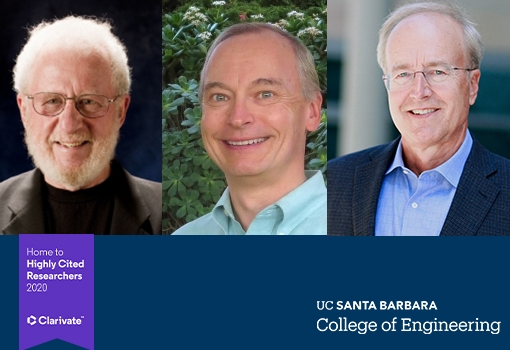John Bowers, Nobel Laureate Alan Heeger, and Chris Van de Walle, three professors in UC Santa Barbara’s College of Engineering, are among the most influential scientists in the world, according to the 2020 Highly Cited Researchers List released by the Web of Science Group, a Clarivate Analytics company. The highly anticipated annual list identifies scientists who are in the top one percent of their field by citations. Researchers on the list have demonstrated significant and broad influence in their fields, reflected in their publication of multiple papers that were highly cited by their peers over the past decade.
"These three prestigious members of our faculty have made discoveries and translated them into applications that have already or have the potential to significantly impact the world, from photonics that underpins the internet to new materials design," said Rod Alferness, dean of UCSB's College of Engineering. "The scientific community that has cited their work benefits greatly from their intellectual contributions, and their work propels us toward a brighter future. We are tremendously proud!"
To determine the list, the Web of Science examined highly cited papers in science and social sciences journals indexed in the Web of Science Core Collection from 2009 through 2019. Highly cited papers are defined as those that ranked in the top 1% by citations for field and publication year. The Core Collection includes more than 20,000 peer-reviewed, high-quality scholarly journals published worldwide.
A distinguished professor in the Materials and the Electrical and Computer Engineering departments, Bowers is a world leader in photonics and optoelectronics. His research focuses on the use of light to transmit data. As a result of his integration of electronic and photonic elements on the same silicon-based chip, the next generations of computers and telecommunications devices will be able to receive and transmit data at much faster speeds while using a fraction of the energy that computers use today. According to Web of Science, Bowers’s publications in the Core Collection received 18,185 citations from 2009-2019.
“I think it is great validation that the research we do at UCSB is getting noticed and changing the world,” said Bowers, the director of UCSB’s Institute for Energy Efficiency, the Fred Kavli Chair in Nanotechnology, and the deputy director of the federally funded American Institute for Manufacturing of Photonics. “I’m lucky to have such great colleagues and students and a great collaborative environment to push the boundaries of research and make new breakthroughs.”
A veteran of industry who worked at Bell Laboratories and Honeywell before joining UCSB in 1987, Bowers has published nearly five hundred journal papers and received fifty-four patents. He is an elected member of the National Academy of Engineering, a fellow of the Institute of Electrical and Electronics Engineers, the National Academy of Inventors, the Optical Society of America (OSA) and the American Physical Society, and the recipient of the OSA Holonyak Award.
This marks the fourth year in a row and fifth time overall that Van de Walle was named a highly cited researcher. His research group performs computational work to develop a fundamental understanding of the physics and chemistry of materials in order to improve existing materials and discover new ones. From 2009-19, Van de Walle’s publications in the Core Collection were cited 29,317 times, according to the Web of Science.
“It’s a true honor to be included among so many excellent scientists,” said Van de Walle, an elected member of the National Academy of Engineering (NAE), and a fellow of the Institute of Electrical and Electronics Engineers (IEEE), the American Association for the Advancement of Science (AAAS), the Materials Research Society (MRS), and the American Physical Society (APS). “It is a wonderful affirmation of the choices we have made in pursuing research topics that will have maximum impact on physics and materials science, and ultimately on technology.”
Van de Walle says that having three faculty from the Materials Department on the list demonstrates the influence that UCSB has on the field of materials science.
“Since its founding, our department has distinguished itself by focusing on forward-looking research directions in areas that others did not recognize or found too hard to tackle. It’s clear that this strategy pays off; having so many faculty included in this list demonstrates that the department is leading the field,” said Van de Walle.
Heeger, now a professor emeritus of the Materials Department, made the list for the seventh straight year. He received the Nobel Prize in Chemistry in 2000 for pioneering research that established him as a co-founder of the field of semiconducting and metallic polymers. Additional honors received by Heeger include the Oliver E. Buckley Prize for Condensed Matter Physics and the Balzan Prize for the Science of New Materials, as well as election to the National Academy of Science, the National Academy of Engineering, the Korean Academy of Science, and the Chinese Academy of Science. He was one of twenty-six Nobel laureates on this year’s list.
Eleven additional researchers affiliated with UCSB made the list: Christopher Costello (cross-field), Joshua P. Schimel (cross-field), Gary Charness (economics/business), Benjamin S. Halpern (environment/ecology), Leon Balents (physics), Andrew N. Cleland (physics), J. Wenner (physics), Anderson Janotti (physics), Jonathan Schooler (psychological and brain sciences), David Tillman (environment and ecology), Samir Mitragotri (pharmacology and toxicology), Daniel Sank (physics), and D. Andrew Howell (space and science).
The 2020 list contains 6,167 highly cited researchers in various fields.

Alan Heeger (left), Chris Van de Walle, and John Bowers (right) were named to the 2020 Highly Cited Researchers List.
